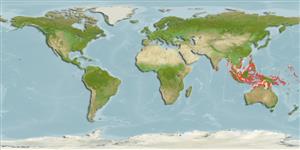Teleostei (teleosts) >
Ovalentaria/misc (Various families in series Ovalentaria) >
Pomacentridae (Damselfishes) > Pomacentrinae
Etymology: Amblypomacentrus: Greek, amblys = darkness + Greek, poma, -atos = cover + Greek, kentron = sting (Ref. 45335).
More on authors: Schlegel & Müller.
Environment: milieu / climate zone / depth range / distribution range
Ecology
Marine; reef-associated; non-migratory; depth range 2 - 35 m (Ref. 9710). Tropical; 23°N - 15°S
Western Central Pacific: East Indies, Philippines, New Guinea, New Britain, Solomon Islands, and Egum Atoll (Solomon Sea).
Size / Weight / Age
Maturity: Lm ? range ? - ? cm
Max length : 8.5 cm TL male/unsexed; (Ref. 48636)
Adults inhabit lagoon and coastal areas (Ref. 9710). Found in sandy or silty areas around outcrops of rubble on sand, mud, sponge or rocks. Occur singly or in small groups. Young often with anemones for protection (Ref. 48636). Oviparous, distinct pairing during breeding (Ref. 205). Abandoned shells and waste bottles serve as nests (Ref. 90102). Eggs are demersal and adhere to the substrate (Ref. 205). Males guard and aerate the eggs (Ref. 205).
Life cycle and mating behavior
Maturities | Reproduction | Spawnings | Egg(s) | Fecundities | Larvae
Oviparous, distinct pairing during breeding (Ref. 205). Eggs are demersal and adhere to the substrate (Ref. 205). Males guard and aerate the eggs (Ref. 205).
Allen, G.R., 1991. Damselfishes of the world. Mergus Publishers, Melle, Germany. 271 p. (Ref. 7247)
IUCN Red List Status (Ref. 130435)
Threat to humans
Harmless
Human uses
Tools
Special reports
Download XML
Internet sources
Estimates based on models
Preferred temperature (Ref.
123201): 27.4 - 29.3, mean 28.8 °C (based on 1662 cells).
Phylogenetic diversity index (Ref.
82804): PD
50 = 0.6250 [Uniqueness, from 0.5 = low to 2.0 = high].
Bayesian length-weight: a=0.01479 (0.00642 - 0.03409), b=3.00 (2.80 - 3.20), in cm total length, based on LWR estimates for this (Sub)family-body shape (Ref.
93245).
Trophic level (Ref.
69278): 2.7 ±0.3 se; based on size and trophs of closest relatives
Resilience (Ref.
120179): High, minimum population doubling time less than 15 months (Preliminary K or Fecundity.).
Fishing Vulnerability (Ref.
59153): Low vulnerability (10 of 100).
Nutrients (Ref.
124155): Calcium = 136 [77, 226] mg/100g; Iron = 0.899 [0.565, 1.395] mg/100g; Protein = 18.6 [17.5, 19.6] %; Omega3 = 0.16 [0.10, 0.25] g/100g; Selenium = 23.5 [13.6, 41.9] μg/100g; VitaminA = 137 [48, 391] μg/100g; Zinc = 2.24 [1.57, 3.08] mg/100g (wet weight);
